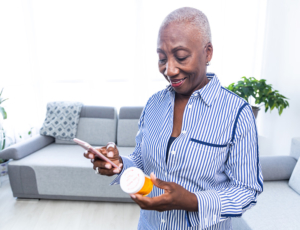Your Guide to Safe Disposal of Medications

Learn proper medication management with the help of Responsive Home Care.
With so many aging parents taking several prescriptions, and with physicians changing and adding medications and dosages to find out the perfect solutions, it is critical to know what to do with meds which are no longer needed or that have expired. There are multiple options for managing medications that need to be disposed:
- Check labels. The medication’s label or informational literature might provide direction on exactly how to safely dispose of the drug. You could also consult the pharmacist for guidelines.
- Participate in National Prescription Drug Take Back Day. This is the preferred way to responsibly get rid of unwanted medications, and it is organized each year in locations throughout the country by the United States Department of Justice Drug Enforcement Administration. Find the venue closest to you as well as the next date for the local event.
- Use caution prior to flushing. Flushing prescription drugs down the toilet is generally not recommended, but there are particular exceptions, laid out in the FDA’s Flush List. Medications currently considered acceptable to flush if another option of disposal isn’t available include:
- Acetaminophen
- Benzhydrocodone
- Buprenorphine
- Diazepam
- Fentanyl
- Hydrocodone
- Hydromorphone
- Meperidine
- Methadone
- Methylphenidate
- Morphine
- Oxycodone
- Oxymorphone
- Sodium Oxybate
- Tapentadol
- Camouflage when discarding. Many medications can be discarded with regular trash, if safeguards are taken to restrict animals from inadvertently ingesting them or from anyone seeking drugs to locate and ingest them. The FDA advises mixing the meds with an undesirable substance – such as coffee grounds or kitty litter – and then placing in a secured plastic bag before adding to your household garbage bag.
- Remove identifying information. Make certain to scratch out and/or shred any personal information to safeguard the older adult’s identification and to prevent anybody who is unauthorized from finding the medicine container and acquiring a refill of the medication.
For more help with medications, including medication reminders to make sure senior loved ones take prescription medications exactly as advised by the health care provider, connect with the aging care professionals at Responsive Home Care. We are also available to assist with a wide selection of aging care needs at home that improve overall wellbeing for cherished older adults, such as:
- Help with personal care and hygiene needs
- Meal planning and preparation
- Light housework
- Companionship to engage in conversations and enjoyable activities
- And a lot more.
Contact us at 954-486-6440 to let us know more about the challenges a senior is facing, and to ask about a free of charge in-home assessment. We’re pleased to have the reputation as the best caregiver in Fort Lauderdale, Florida and the surrounding areas, and we’re available to help make life better for a senior you love, any time!
